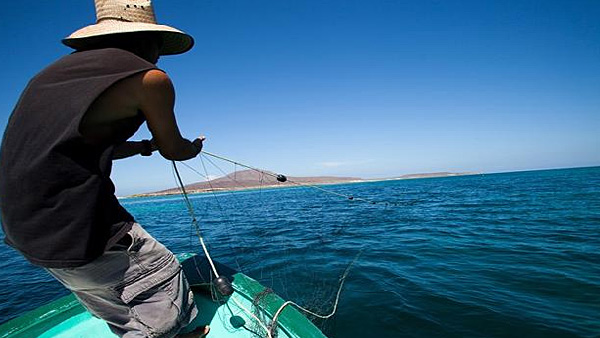| Study: Alarming Plummet in Small-Scale Fisheries Alison Auld - Canadian Press | |
| go to original October 7, 2012 |
|

A man fishes for turtles in Loreto, Mexico in this undated handout photo. Many of the small-scale fisheries that provide food to coastal communities around the world are in sharp decline, suggests a new study that links their poor health to a lack of proper monitoring. (Canadian Press/Jason Houston)
Many of the small-scale fisheries that provide food to coastal communities around the world are in sharp decline, suggests a new study that links their poor health to a lack of proper monitoring.
A team of U.S.-based researchers looked at more than 2,000 fisheries that are not subject to formal stock assessments, finding that many were plummeting at alarming rates.
Chris Costello, lead author of the study published Thursday, said they focused on the thousands of global fisheries that are not studied, adding that only 250 out of the world's 10,000 fisheries undergo formal assessments.
"The unassessed stocks tend to be in substantially worse shape than the assessed stocks," Costello said about the study in the journal Science.
"Without good information on fish populations, managing sustainably can be a hard thing to do. It's like trying to decide how far you can drive your car without knowing how much gas is in the tank."
The researchers said the information gives a truer sense of the state of global fisheries and shows the value of regular stock assessments, particularly when it comes to the vital food source fisheries provide in developing nations.
But the study found that developed countries like the United States and Canada also had unassessed fisheries that were suffering and nearing collapse, with sharks being the group of fish in the worst shape globally.
It's a worrisome finding for the bulk of the small fisheries that are critical to food security, but may not have the profile of the larger, commercial fisheries, like tuna, cod and salmon, which are more closely regulated.
Governments are more likely to take action if there are signs of trouble in larger, lucrative export-based fisheries compared to a smaller, unassessed one that supports communities, Costello said.
"It's harder to ignore when a big food production fishery starts to decline," he said. "If all you're doing is hurting the local community in the Philippines, who's paying attention?"
Costello said the unassessed, data-poor fisheries account for more than 80 per cent of the world's catch. He concedes that the research is intuitive since measuring the size, abundance, proliferation and reproductive rates of a species would help determine how many can be safely caught.
The authors say that even though more than half of the assessed fisheries have a biomass — or quantity of fish — that is below desired levels, the majority have lowered catch rates to allow for eventual recovery.
"If we look at assessed stocks, we can be pretty satisfied that fishery management systems are generally working to assure long-term sustainability," said Ray Hilborn, a University of Wisconsin professor and co-author of the report.
"For unassessed stocks, this doesn't appear to be true."
Costello, a professor of resource economics at the University of California Santa Barbara, said the amount of harvested fish could increase by up to 40 per cent if fisheries managers or fishermen monitored the stocks to get a better sense of how many fish there are and how many can be safely caught.
That's done largely by leaving enough fish in the water to reproduce at levels that would maintain sustainability and grow the stock.
Researchers are recommending that formal or informal stock assessments should be done, whether through governments, fishermen or a combination of both. They also cite the success of fisheries co-operatives in Japan, Mexico and Chile that give more rights to fishermen to manage the stocks.
We invite you to add your charity or supporting organizations' news stories and coming events to PVAngels so we can share them with the world. Do it now!
Celebrate a Healthy Lifestyle
 From activities like hiking, swimming, bike riding and yoga, to restaurants offering healthy menus, Vallarta-Nayarit is the ideal place to continue - or start - your healthy lifestyle routine.
From activities like hiking, swimming, bike riding and yoga, to restaurants offering healthy menus, Vallarta-Nayarit is the ideal place to continue - or start - your healthy lifestyle routine.